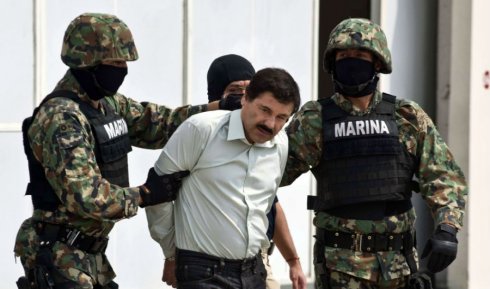Read Spanish version from La Izquierda Diario Mexico, July 13, 2015
Enrique Peña Nieto’s face said everything. The government is coming out of an election in which they lost a number of votes to the Institutional Revolutionary Party (PRI) and are facing a tough challenge from the teachers’ unions, as well as a downward economic growth and strong devaluation pressures. And now “El Chapo” Guzmán’s escape has taken place right under their noses; it’s a real crisis for the administration that still three years left.
Peña Nieto was not expecting it, and quickly the parties and the “political class” demanded his return from his tour in France to deal with the crisis.Instead, Nieto sent his Secretary of the Interior, Osorio Chong, in a decision that, (if El Chapo doesn’t “appear”), will possibly have political costs.
Peña Nieto and the cartels
The escape of Guzmán Loera creates long shadows of doubt about the Mexican Government’s ability to control drug trafficking; a sensitive subject for businessmen and the US Government and was what Peña Nieto used to differentiate himself from his predecessor, Felipe Calderón. In early 2014, Joaquín Guzmán Loera’s arrest was just one of the PRI government’s attempts to appear “reliable”.
It is obvious that these doubts about his ability to negotiate and arrest cartels are a concern to the White House. The US government wants to keep the big drug cartels at bay (and in Mexican territory), and in particular does not want the territorial fights and drug routes to reach the US.
That is the reason that the US Attorney general, Loretta E. Lynch, quickly communicated with the head of the Mexican Department of Justice. Under Osorio Chong’s orders various officers and trustees of the high-security Altiplano prison are being arrested.
The people’s mistrust and rejection
Another issue that is evident in the current crisis is the collision between drug dealers and sectors of the State. Beyond interpretations which support that the pact between Guzmán and the government had been broken (in 2014 he had handed himself over in exchange for leaving his territory untouched), the fact is that it’s impossible to conceive that two escapes from high-security prisons in 15 years would be possible without an extended network of complicity at the highest level. Comments on social media, which turned viral as the news was released, show that there is a high level of distrust and repudiation of the authorities and the State amongst broad sectors of the population The same distrust that was seen in September of last year during the Ayotzinapa protests.
The true impact of Guzmán’s escape remains to be seen. The blow this means to the Peña Nieto administration does not end with the impact of the escape and the fact that it appears incapable of keeping the “boss” behind bars.
It also remains to be seen if this could open up a new spiral of the drug war, with new clashes between cartels and new disputes over cities and drug routes. The cartels reasoning for breaking the alleged pact with Peña Nieto are among the most active and violent in recent months.
If a new chapter in the drug war begins, the workers, youth, and people in general will have to confront yet another attack on their democratic freedoms as well as an increase militarization, which has been common in recent administrations.










